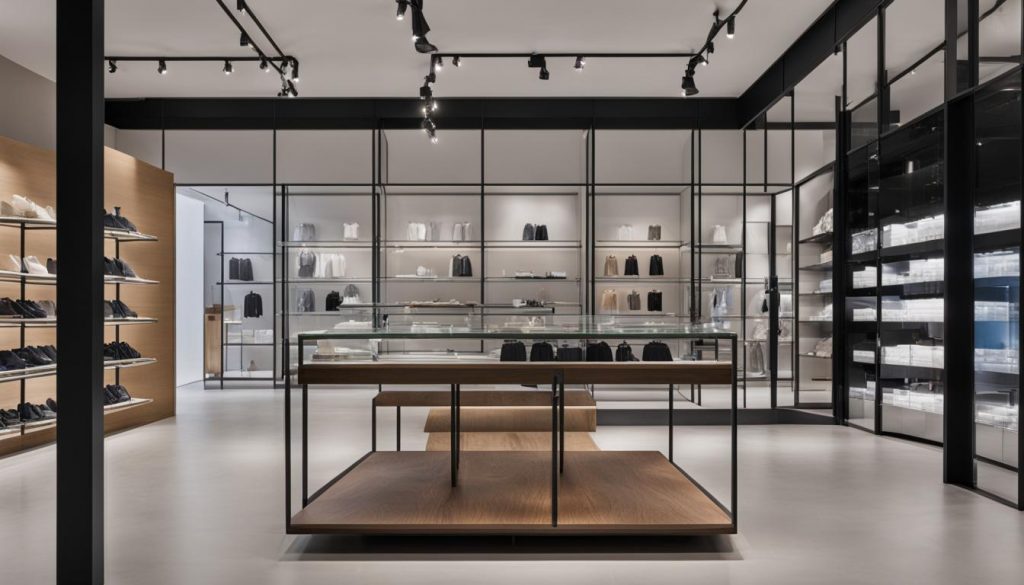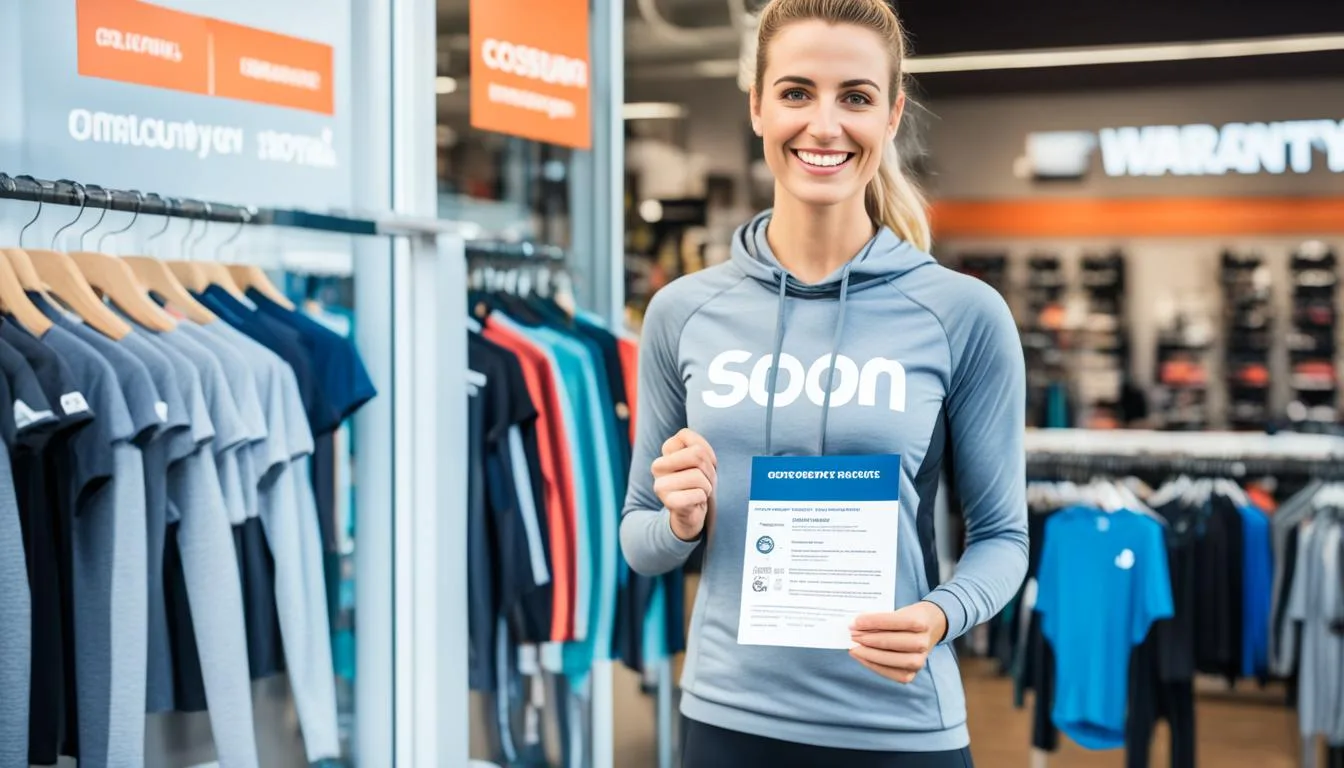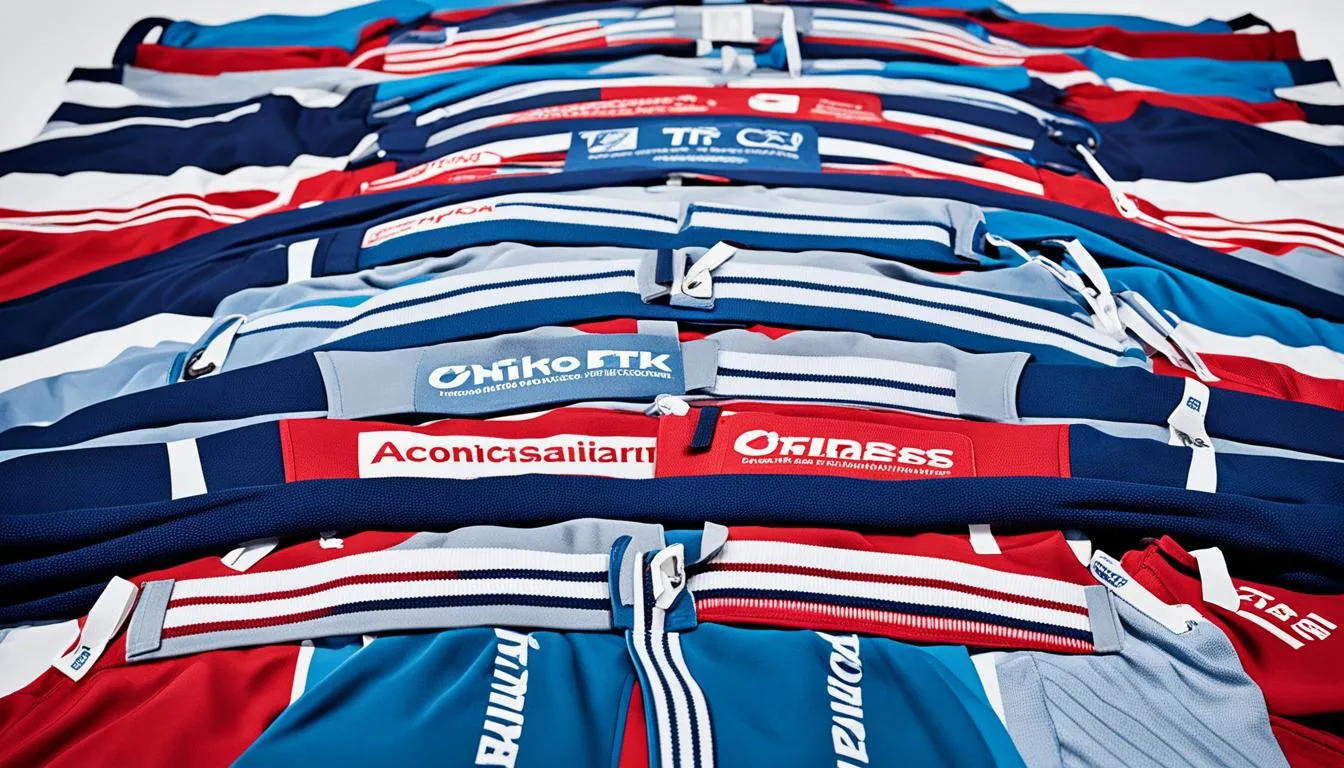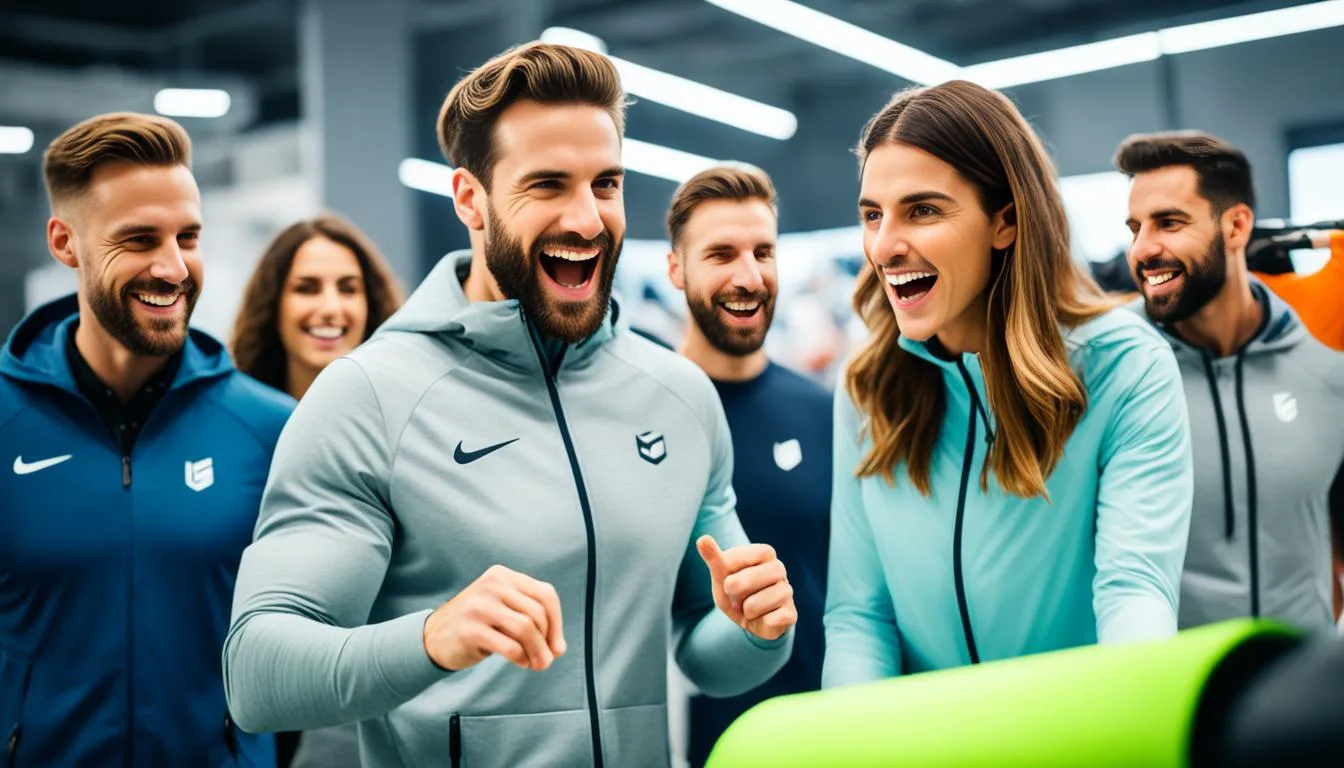Ethical Sourcing: Transparency in the Sportswear Supply Chain
Connect With Us Today
Consider us for your next production run. Why wait? Send us your questions here.
In our journey toward ethical manufacturing, we’ve seen big changes in sportswear companies. They’ve focused on ethical sourcing, committed to sustainability, and improved transparency in their supply chain. Big names like adidas, Levi Strauss, and Nike are now sharing their tier-1 supplier factory details. This shows our industry’s push for social responsibility, fair labor, and clear policies. These are key in making the fashion industry better.
The move to openness has been growing for over a decade. It wasn’t quick. Since “Fashion’s Next Trend” in December 2019, more companies have been open about where they source materials. This marks an important step in our story together. Our progress shows the industry’s ability to change and our strong commitment to ethics.
Key Takeaways
- Escalation in transparency for tier-1 supplier factory details by brands post-2019.
- Noteworthy decade-long trend of disclosure by global apparel companies.
- Early adoption of supply chain transparency by influential brands like adidas and Nike.
- Variability in the extent of details shared, underscoring an evolving transparency narrative.
- Coalition formed by labor and human rights organizations advocating for transparency.
- Embracement of ethical sourcing, reflecting the integral role of sustainable practices in the sportswear industry.
Understanding the Weight of the Rana Plaza Tragedy on Ethical Sourcing
The Rana Plaza Tragedy made the fashion world take a hard look at itself. It showed clear failures in putting workers’ safety first. This disaster made everyone think deeply about how clothes are made. It was more than just a tragic event. It pushed for major changes, making the world demand better for workers.
A Stark Reminder of Safety and Wellbeing in the Fashion Industry
The collapse shocked everyone around the world. It showed the dangers workers face for fast fashion. This made it clear that the industry must balance cost with safety. Because of this tragedy, there’s now more talk and action on improving how the fashion industry works.
Outlining the International Response and the Accord on Fire and Building Safety
After the tragedy, leaders, NGOs, and governments acted. They set up new safety measures. A key achievement was the Accord on Fire and Building Safety in Bangladesh. This agreement works to stop such disasters before they happen. It’s a big step toward safer, more ethical fashion.
Now, companies are really thinking about where their clothes come from. Tools like the Higg Index guide them toward better practices. And places like the UK Parliament are pushing for tougher rules. There’s progress in being more ethical. But there’s still a long way to go. The fashion world must remember the Rana Plaza tragedy to avoid repeating past mistakes.
Sportswear and the Pandemic: A Call for an Ethical Reset
The Pandemic Impact has forced us to rethink the Sportswear Industry. It’s time for an Ethical Reset to fix major disruptions in the Supply Chain. As we look closely, the well-being of Garment Workers depends on what the industry and buyers do. The issue of Canceled Orders shows how crucial it is for us to be responsible and accountable.
Canceled Orders and Their Dire Consequences on Garment Workers
Inflation has hit a high not seen in 40 years in Europe and the U.S. This, along with supply chain issues, caused a domino effect. Canceled orders have cut profits for businesses and endangered garment workers’ welfare. Brands around the world are being criticized for stopping orders suddenly, causing widespread problems.
Transparency and Accountability in Times of Crisis
During the pandemic, only 6 percent of sports goods companies felt confident in their ability to withstand the crisis. Meanwhile, 22 percent thought they would see a drop in revenue and profits by more than 5 percent. Also, shoppers are buying less. Over 50 percent plan to cut down on purchases, and about 20 percent are looking for cheaper options. This situation calls for more transparency and accountability. This will help protect the industry’s honor and look after garment workers during these hard times. Now more than ever, sports companies must acknowledge their moral duties. It’s important to support their workers and the communities they affect.
The pandemic has shown us how connected our world economy is. The well-being of people ties directly to the ethical actions of sectors like sportswear. As an industry, we should aim to ensure both financial strength and fairness. These should be the foundation of our way forward.
Spotlight on the UK: Unraveling the Threads of Labor Injustice
Exploring the UK Fashion Industry, we find a complex mix of Labor Injustice. This is in stark contrast to its image of ethical design. To achieve Fair Wages, many UK brands are changing their strategies. They make sure their practices meet the high standards of ethical sourcing. Our research shows that sometimes Working Conditions and salaries don’t even meet basic standards.
Ethical Sourcing is crucial for the survival and honor of the Sportswear Supply Chain. We urge for major changes to correct the wrongs in the fashion world. Boohoo, for example, took significant steps after finding out about poor conditions in their supply chain. This wasn’t just about being held accountable. It was a chance for the industry to look inward and improve.

| Action | Outcome | Future Commitment |
|---|---|---|
| Transparency in Supply Chain | Consumer Trust Increase | Ongoing Disclosure |
| Supplier Standardization | Enhanced Quality Control | Continual Auditing |
| Improvement in Working Conditions | Worker Satisfaction Surge | Sustained Environment Upkeep |
| Wages Reassessment | Employee Retention Boost | Livable Wage Implementations |
We must keep up our efforts tirelessly. We aim to correct current labor issues and stick to practices that uphold Fair Wages and Working Conditions. Embracing full ethical sourcing makes the sportswear supply chain fairer. It can benefit everyone involved.
Evolving Ethical Practices: The Journey of Everlane Towards Radical Transparency
We are moving forward, adopting a responsible business model. It’s important to highlight brands like Everlane. They lead the way in sustainability and radical transparency in the fashion scene.
The Business Model Predicated on Honesty and Direct Communication
Everlane is built on honesty and open communication. This sets new standards for the industry. They understand their customers well. This understanding places them in a unique position.
With their radical transparency, trust among consumers has grown. They clearly share the production costs, the factories’ locations, and what materials they use.
Consumer Insight as a Gear Change for Ethical Purchasing
Our buying habits show our collective awareness. Consumer insight reveals that transparency drives change. Everlane uses this insight well. They commit strongly to sustainable practices.
This commitment helps shift towards ethical purchasing. They give customers all the info needed to make informed choices.
Below is a table comparing ethical and traditional activewear practices:
| Aspect | Conventional Activewear | Sustainable Activewear Brands |
|---|---|---|
| Material Source | Petroleum-based synthetic fibers (polyester, nylon, acrylic) | Recycled materials; Organic, non-petroleum based fibers |
| Environmental Impact | Negative: Biodiversity loss and resource depletion | Positive: Focus on biodiversity and resource sustainability |
| Transparency & Certifications | Limited; often unclear supply chains | Open practices; Certifications like bluesign, Global Recycled Standards |
| Brand Examples | Traditional big-name sportswear brands | Brands like Girlfriend Collective, Patagonia with SA8000 certification and green efforts |
Looking at these insights, we see a market shake-up. The push for ethical purchasing reflects a wider move towards accountability. Everlane leads this change. They inspire us all to strive for a more fair and green future in fashion.
Girlfriend Collective’s Radical Approach to Sportswear Sourcing
Girlfriend Collective stands out in the sportswear world. They have embraced a radical approach to make sportswear sustainable. They are known for ethical sourcing and holding the SA8000 Certification. This means they follow top social accountability standards. Their clothes are not just trendy. They also reflect the highest ethical manufacturing practices.
Through consistent commitment to sustainability, Girlfriend Collective uses recycled post-consumer bottles to craft a range spanning from sizes XXS to 6XL, echoing a message of inclusivity and responsibility towards the planet.
Understanding where the materials for activewear come from is vital. Girlfriend Collective knows this well. They look at the environmental, social, and economic impacts of their products. They ensure that every step, from making the yarn to finishing the product, is done with care.
- Focus on biodiverse preservation
- Reduction of waste and pollutants
- Continual investment in sustaining natural resources
Girlfriend Collective stands up for ethical clothing production. They use their influence to push for more sustainable clothing options. This sets a strong yet noble standard for others in the industry.
| Aspect of Sustainability | Girlfriend Collective’s Initiative | Industry Average |
|---|---|---|
| Recycled Materials Usage | Recycled post-consumer bottles in all products | Limited or no use of recycled content |
| Size Inclusivity | XXS to 6XL product range | Often limited to standard sizing conventions |
| Manufacturing Ethics | SA8000 Certified facilities ensuring fair labor practices | |
| Transparency Commitment | 100% Tier 1 supplier list published | 60% release their supplier lists |
| Material Innovation | Commitment to reduce virgin polyester and synthetic materials | 23% have set similar targets |
Girlfriend Collective truly lives by their ethical beliefs. They encourage buyers to make smart choices. By doing so, we all can promote a future where activewear stands for social and ecological care.
The Transformative Power of Transparency in Fashion Retail
In the world of fashion retail, transformative transparency is now key. This is especially true in the sportswear industry. There’s a big focus on environmental, social, and governance (ESG) factors. The industry is moving towards more action to empower stakeholders, and it’s happening fast.
Pillars of Transparency in the Sportswear Industry
Transparency in sportswear is shaped by a report with 12 action areas. These areas match with a full ESG approach. This shows that being open about the supply chain is necessary. It helps brands stand out and improves customer experience.

Different groups within the industry are working together well. They promote sustainable fashion. This makes sustainability core to fashion retail. It changes how people see brand value and trust. The sportswear industry is finding ways to be profitable and sustainable.
Empowering Stakeholders Through Openness in Supply Chains
The big change is about making stakeholders more powerful through supply chain openness. Every second, tons of clothes are thrown away. So, the retail industry must take more responsibility.
This change is already happening. For example, The Jeans Redesign project aims to make circular design normal by 2023. Brands like Weekday are working to meet these standards in more than 60% of their collections. It shows real progress and impactful changes.
Laws are also shaping the industry. Over 35 new sustainability rules are coming. This pushes brands to use better raw materials. Those who do can gain a lot financially and help the environment.
We’re working to cut GHG emissions by 45% by 2030. We also want to improve how we use raw materials. Over 85% of top fashion brands plan to reduce their carbon footprint. A $1 billion fashion brand could make hundreds of millions more in five years by choosing better raw materials. This proves that ethical growth brings real benefits. So, we keep pushing for transparency to become the standard in fashion retail.
Industry Standards and Human Rights: The Evolution of Supply Chain Visibility
We see the importance of Industry Standards and Human Rights in improving Supply Chain Visibility in fashion. Shockingly, 10% of reports to the Modern Slavery & Exploitation Helpline in 2021 were about the garment sector. This shows the need for better Brand Disclosure and ethical practices.
Corporate Accountability becomes crucial with 20% of the world’s cotton coming from Xinjiang, China. Here, forced labor is a real concern. A huge amount of clothes and textiles, worth billions, enter G20 countries every year. These items may not have been made fairly. Our buying choices and brand decisions matter a lot on a global level.
The Growing List of Brands Embracing Supply Chain Disclosure
Some brands like Adidas and Patagonia are starting to share details about their production. This shows their commitment to being open and respecting human rights. It’s a positive sign that things are changing.
Corporate Accountability and the Push for the Transparency Pledge
The Transparency Pledge marks a big shift. It came after the Rana Plaza building fell, highlighting the need to protect workers. The UK Modern Slavery Act now requires big companies to report how they are fighting slavery. Thanks to modern slavery insights in fashion, we understand the importance of these actions for Corporate Accountability.
Generation Z and the Ethical Mandate for Eco-conscious Sportswear
Generation Z leads the way in pushing for eco-conscious sportswear. They are changing how we think about sustainable clothes. Their drive for ethically made clothes influences shopping habits, emphasizing the planet’s well-being and fairness. Insights from Positive Luxury consultancy show how sustainability connects with young buyers. Brands learn they must share these values to win them over.
Defining Sustainable Apparel Sourcing from a Youth Perspective
For Generation Z, it’s not just about the clothes but their journey from design to reality. Their passion for ethics is visible in the rising use of eco-friendly materials like Tencel and Lyocell. They do their homework, valuing brands that are clear about where their products come from, as seen in sustainable fashion analyses.
Forming Consumer Habits Around Ethical Production and Practices
Generation Z cares about ethics and wants to stand out, according to a LIM College study. This blend of style, value, and sustainability encourages brands to weave ethical practices into their story. While some are slow to change, per the Pulse of the Fashion Industry report, many are making strides. A strong 66% have adopted multiple sustainability measures, marking a shift towards ethical production.
The next table shows how Generation Z’s preferences are changing the fashion world, promoting a more ethical future:
| Generation Z Preferences | Industry Response | Statistics |
|---|---|---|
| Eco-friendly Materials | Increased use of sustainable fibers | 19.7% increase in Tencel and Lyocell by Mara Hoffman |
| Support for Social/Environmental Causes | Brands incorporating social responsibility | 90% of millennials prefer brands supporting causes |
| Transparency in Sourcing | Movement towards open supply chains | 66% of brands applying at least 5 sustainability initiatives |
| Emotional Impact of Sustainability | Brand narratives focusing on the ’emotion’ of green practices | Primary focus of year as forecasted by Positive Luxury |
| Ethical Investment | Growth in sustainable fashion investments | Potential 1 to 2% EBITA margin growth by 2030 |
Generation Z and brands are creating a new market focused on sustainability. This partnership aims for responsible consumption. Together, they promote eco-conscious sportswear, improving society and the planet.
Lifting the Veil: The Necessity of In-Depth Supply Chain Information
In today’s market, labels showing the Country-of-Origin are just a start. It’s not enough for the aware shopper. The dive into Supply Chain Transparency shows us that knowing the full story of our products is crucial. Traceability and in-depth info are now a must-have, not just nice to have.
Demand for Traceability Beyond the Country-of-Origin Label
Shoppers want more than just the basics. They’re asking for the full tale of a product’s journey. This includes knowing where materials come from, the conditions of their making, and who turns them into what we buy. Traceability connects us deeper, building real Consumer Trust based on true stories and ethics.
The Role of Enhanced Transparency in Consumer Trust
Transparency is key to earning trust. Brands open about their ways meet ethical marks and win hearts. Pointing to theThomson Reuters Foundation’s Stop Slavery Award, great companies stand out for fighting forced work and ensuring fairness. For example, Adidas stands tall in this fight, showing how clear supply chains boost brand love and trust.
| Issue | Impact | Response |
|---|---|---|
| Illegal profits from forced labor | US$150 billion annually in sportswear supply chain | Recognition through awards such as the Stop Slavery Award |
| Banking violations for anti-money laundering failures | US$1.3 billion deferred prosecution agreement | Implementing stricter compliance programs |
| Anti-Money Laundering Act violations | 57,000 allegations with potential penalties up to A$18 million each | Corporate accountability and reforms |
These numbers are a wake-up call. Sticking to old ways hides the truth of supply chains. As we push for honest sourcing and transparency, we must all make sure these values stay at the heart of consumer trust.
Implementing Ethical Manufacturing: More Than Just a Label
In the world of fashion, we closely examine what lies behind the ‘sustainable’ labels. It is crucial to recognize the trailblazers in the industry. These leaders not only talk about ethical practices but act on them too. Big names like Adidas, Levi Strauss, Nike, Patagonia, and Puma have been transparent about their suppliers for many years. This shows their deep commitment to ethical sourcing in sportswear.
Assessing Fashion Brands’ Commitment to Ethical Practices
True ethical manufacturing goes beyond just a brand’s image. It involves real action. Since December 2016, the push for transparency has grown. Brands like Gap Inc., Marks and Spencer, and New Balance have started sharing their supplier details. This move supports the call from labor and human rights groups for companies to commit to the Transparency Pledge. This pledge represents a promise to uphold ethical practices, labor rights, and worker human rights in sportswear.
Real Measures Versus Marketing in the Sportswear Arena
In sportswear, real actions mean real improvement. This includes thorough factory audits, certifications like GOTS, and reducing environmental harm. The push for ethical manufacturing is growing, shown by an increase in sales of Fair Trade Certified goods. A whopping 67% of consumers are ready to pay more for products from transparent chains. This signals a shift. Now, sportswear brands must do more than just make promises to meet the ethical expectations of today’s consumers.
| Brand | Ethical Practices Rating | Transparency Index Score | Environmental Impact | Labor Conditions | Animal Welfare |
|---|---|---|---|---|---|
| Lululemon | Not Good Enough | 51-60% | Not Good Enough | No living wage evidence | Dropped to Not Good Enough |
| Adidas | Advanced | 61-70% | Fair | Commitment to living wage | Uses recycled materials |
In ethical fashion, progress varies by company. Lululemon, for example, needs to do better in ethics and animal welfare. Transparency is key. Consumers trust brands more when they use technology like blockchain to track their products. This has improved customer loyalty and trust.
We keep analyzing these trends to separate real ethics from mere talk. Actions like detailed supplier audits and clear communication about sustainability efforts lead us toward an ethical and transparent fashion future.
Conclusion
Looking at how sportswear companies deal with ethics, transparency is key. Transparency ensures fairness and sustainability in fashion. Big names like adidas, Levi Strauss, and Nike now share more information about their suppliers. This is a big improvement.
Consumer interest has pushed brands to take responsibility seriously. Now, they’re not just following rules; they’re leading a major change. This change towards openness is creating a cycle of responsibility. It also meets the demands of today’s buyers, who care about ethics.
Movements focused on worker rights are inspiring companies to commit to transparency. This pledge to transparency helps build trust and promote ethical business.
Our journey is filled with hope and hard work. Events in Bangladesh and Pakistan remind us of the challenges. But we are making changes, thanks to groups fighting for transparency and worker rights.
We are part of an important movement towards openness and fairness. This movement aims to ensure that respect and integrity are at the heart of fashion. Everyone in the supply chain deserves this respect.
FAQ
What is ethical sourcing in the context of the sportswear supply chain?
How did the Rana Plaza tragedy impact ethical sourcing practices?
What is the significance of transparency during crises like the pandemic?
How have UK fashion brands addressed allegations of labor injustices?
What does Everlane’s radical transparency entail?
How is Girlfriend Collective setting an example in ethical sportswear sourcing?
What role does transparency play in empowering consumers and stakeholders in sportswear?
Which brands are embracing supply chain disclosure and what is the Transparency Pledge?
How does Generation Z influence the move towards ethical and eco-conscious sportswear?
Why is it important for brands to provide traceability and detailed supply chain information?
What distinguishes real commitment to ethical manufacturing from mere marketing?
Source Links
- https://www.hrw.org/report/2017/04/20/follow-thread/need-supply-chain-transparency-garment-and-footwear-industry
- https://en.wikipedia.org/wiki/Sustainable_fashion
- https://www.npr.org/sections/parallels/2017/04/30/525858799/4-years-after-rana-plaza-tragedy-whats-changed-for-bangladeshi-garment-workers
- https://www.mckinsey.com/industries/retail/our-insights/sporting-goods-2023-the-need-for-resilience-in-a-world-in-disarray
- https://www.just-style.com/news/investors-gravely-concerned-by-nikes-silence-on-supply-chain-risks/
- https://apparelimpact.org/columbia-sportswear-case-study/
- https://www.rhsmith.umd.edu/news/in-the-news
- https://www.cnn.com/cnn-underscored/fashion/best-sustainable-activewear-brands
- https://remake.world/2021-remake-fashion-accountability-report/
- https://digitalcommons.du.edu/cgi/viewcontent.cgi?article=3241&context=etd
- https://www.accenture.com/us-en/insights/retail/sustainability-retail
- https://www.ellenmacarthurfoundation.org/topics/fashion/overview
- https://www.bcg.com/publications/2023/driving-profitability-with-raw-materials-in-fashion
- https://www.unseenuk.org/modern-slavery-in-fashion/
- https://www.heuritech.com/articles/sustainable-fashion-transparent-brands/
- https://www.thomsonreuters.com/en/reports/modern-slavery.html
- https://goodonyou.eco/how-ethical-lululemon/
- https://www.abiteks.com.tr/blog/what-manufacturers-need-to-know-about-transparency-and-traceability-in-the-textile-industry
Latest News
How Collaboration Shapes Consumer Preferences in Sportswear
Navigating Consumer Rights and Warranties in Sportswear Sales
Artificial Intelligence in Fashion Forecasting and Trend Analysis
The Shift Towards Inclusive Sizing in Sportswear: Consumer Reactions
The Global Expansion of Luxury Sportswear Brands
From Sketch to Gym: The Design Process of Fashionable Sportswear
Understanding the Role of Trade Associations in Sportswear Compliance
How Economic Trends Influence Consumer Spending on Sportswear
Learning from Successful Global Market Entries
Best Practices for Managing Cross-Cultural Teams
Using Technology to Fight Counterfeit Fashion Products
Carbon Nanotube Fabrics for Superior Strength and Flexibility
The Growth of Fitness Tracking Apparel in Health and Wellness
Exploring the Influence of Social Proof in Sportswear Purchasing
Strategies for Managing Compliance in a Multinational Operation
Trends in Global Footwear: Performance Meets Lifestyle
The Role of Artificial Intelligence in Tracking Supply Chain Operations
Evaluating the Success of Sportswear Collaborative Projects
Evaluating the Potential of Emerging Markets
Global Shifts Towards Gender-Neutral Sportswear
Share This Article
Latest Articles



















